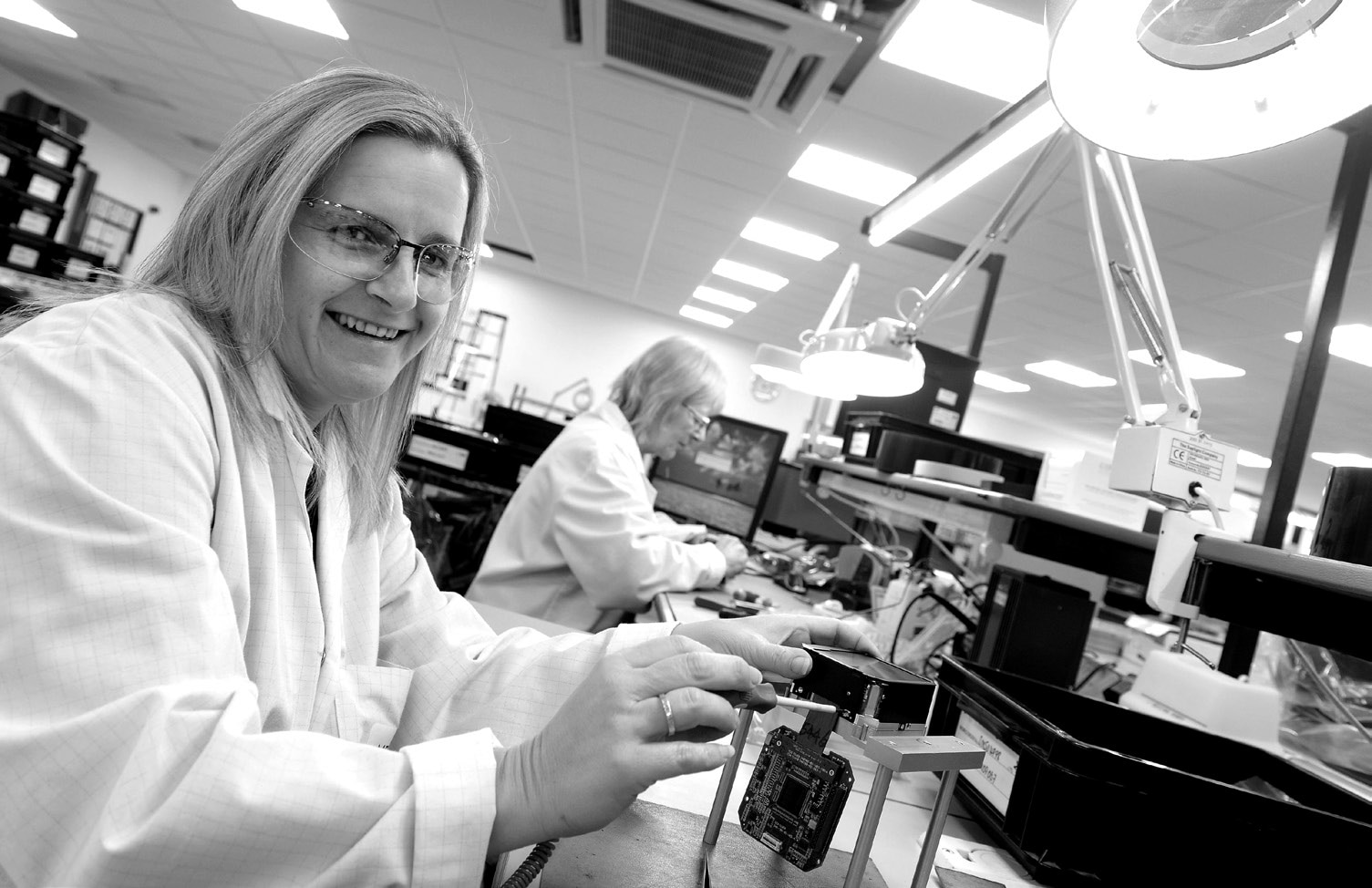
Above: Long-time colleagues. Front: Colleen Durrant agrees with Viv Cane (back): We all have to do this together. We [in the production cells] won’t keep progressing if everyone around us isn’t wanting to do the same.
Listening to the women in white coats

Viv Cane and Colleen Durrant build three-inch secondary avionics display and sub-assemblies. Each unit takes about three hours of the kind of precise, painstaking and absorbing work in which time stands still.
Both women have experience of Daily Layered Accountability-type systems at previous employers—Cane working on marine systems and Durrant building lasers.
Joining Meggitt Avionics (MAV) six years ago felt like travelling back in time for Cane. “It felt a bit like the Dark Ages,” she admits. Shopfloor problem-solving barely existed and work-arounds and make-dos were common. “If your supervisor couldn’t sort something out for you, the problem could drag on for ages.”
Wasn’t that a bit depressing? “Not depressing. I love the work too much. But it was frustrating and there was a lot of tension sometimes. You needed a dark sense of humour.”
Durrant re-joined MAV two years ago. After a particularly rough day, she would sometimes head home thinking ‘I don’t want to go back there ever again.’ “You can’t lose your temper at work so you do take the stress home with you,” she says.
And what’s it like now?
“Oh it’s much, much better,” says Cane brightly. (The answer was written on her face a good second or two before she spoke). “The frustration is mostly gone. If we bring something to the morning meeting, we know that when it goes on the DLA board it can’t be ignored or forgotten. We have a voice now and it is being heard. There’s a big improvement in how quickly things get sorted out. It’s such a relief.”
Durrant hasn’t forgotten the old frustrations of trying to explain something important when nobody seems to be listening. “It can be very hard when you can’t seem to get your point across. Now, once it’s written on the DLA board, you know that someone has to try and understand what it is you are getting at.”
We are impatient for change. Once you see what's possible you do get hungry for more
All the strands of the business are interlinked so we all have to be involved for this to work properly
Both women say Meggitt Production System has been very well-received right across the organisation. Even some notable sceptics have quickly been won-over by the reality. But both women still worry that not everyone is pulling their weight and that some managers might slip back into old ways.
“DLA doesn’t suit some people,” says Cane. “It requires a certain mind-set. You have to enjoy being more involved and you have to accept that it means more effort. Once you buy into it, you can’t be lazy. You’ve got to get yourself moving.”
“Most of us really want to keep pushing the improvements and make things even better,” says Durrant. “But we all have to do this together. We [in the production cells] won’t keep progressing if everyone around us isn’t wanting to do the same.”
Their immediate cell colleagues are not the concern. “We are very lucky. The people we work with are only too willing to help if you have a problem,” says Cane. It’s more a question of the support the cell gets from outside. “We do still hear a bit of the old ‘that can’t be done’ and ‘that’ll take a while’. They’re letting the side down really. All the strands of the business are interlinked so we all have to be involved for this to work properly.”
And what do they say to the sceptics? “I tell them they should be doing it for themselves. Their day will be easier and they’ll get more out of their life at work,” says Cane. “We are at work for such a long time. We really should try to get as much satisfaction out of it as we can.”
“And it’s not like it’s change for change’s sake,” adds Durrant. “It’s responsive change—responsive to us making the things we sell, making sure we’ve got what we need on the shopfloor. That makes a big difference for me.”
And what about managers who might be uncertain about what MPS means for them? Cane: “I’d say, make sure you talk to your people on the shopfloor. Their ideas have never got to the surface simply because of where they work. But they are full of good ideas because they do this job hour after hour, week in, week out. DLA can make the most incredible difference. Listen to them.”
So is everything in the garden rosy now? Cane and Durrant look at each other with amusement. “Noooo,” they chorus. “Some days it still feels like you are banging your head against a brick wall,” explains Cane, “but it’s different now. Back then it was because nothing ever seemed to change and nobody seemed to listen. Now it’s because we are impatient for change. Once you see what’s possible you do get hungry for more.” ■
